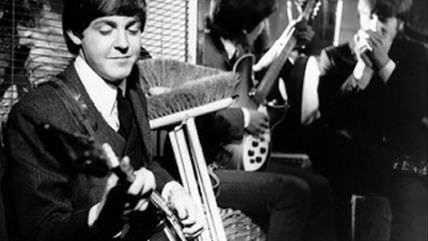A Hard Day's Night: Beatlemania Revisited
Richard Lester's pop classic shines again in a new Criterion restoration.

A Hard Day's Night, Richard Lester's madcap Beatles film, has been so pervasively influential – on music videos, TV commercials, and of course other movie directors and editors – that today its innovations seem almost commonplace. This was not the case when the film premiered in London 50 years ago – on June 6, 1964, to be precise, in the full roiling ecstasy of Beatlemania. Then, the picture's electrifying jolt of pop energy was a fanfare for a new era, and it was soon embraced almost universally, even by critics who up until that point had resisted the Beatles' music. As Roger Ebert later recalled, "I started letting my hair grow while I was watching that movie."
The Criterion Collection's new restoration of A Hard Day's Night, which opens today (July 4) in 50 cities across the country, brings us as close to that long-vanished period as we're likely to come any time soon. It's an extraordinary feat of digital salvage, blowing away all the dust and grit and warps and scratches from the original camera negative (and two master prints) to restore the film's sumptuous grayscale and its crisp black-and-white gleam in ultra-high 4K resolution. The audio tracks have been obsessively remastered under the supervision of Giles Martin (son of Beatles producer George Martin), who has elsewhere explained why the songs performed in the film are very slightly slower than the Beatles' recorded versions. (Martin says that because the concert scenes were set in a television studio, it was necessary to shoot them at 25 frames per second, rather than the customary 24, in order to avoid creating the illusion of flickering on the studio's many monitors; when these scenes were knocked back down to 24 frames per second for the finished film, the music tempos were lagged as well.)
This refurbished edition of the movie is also at the center of a three disc Criterion box set that includes much additional material – among other things, an hour-long making-of documentary (hosted by Phil Collins, who was one of the cheering kids in the film's concert scenes) and a performance of "You Can't Do That" that was cut from the movie because, according to Lester, the Beatles had recorded too many new songs for it.
Need it be said that the nine songs that did make the cut ("I Should Have Known Better," "Can't Buy Me Love" and the title track among them) can still sweep you away with the freshness of their invention? And that even after all this time, the Beatles' radiant charisma remains undimmed? The picture is not without flaws, of course. Seen today, not every passing witticism works. And the movie's central annoyance – a tediously sour performance by Wilfrid Brambell as Paul McCartney's grandfather – remains annoying. (Even Lester later admitted that the creation of this character was a mistake.) As was the case when the movie first appeared, one wishes that Brambell would just go away. Fortunately, whenever the Beatles are onscreen – which is most of the time -- he immediately fades from notice.
The movie plays like a documentary, but of course it wasn't made that way – well, not completely. The story was scripted (by Liverpudlian playwright Alun Owen), and since the Beatles weren't actors, the structure of the screenplay, according to Lester, "had to be a series of one liners," which the group members delivered – in the famous press-conference scene – with their usual vinegary panache. The main roles in the movie were cast with professional actors, like Richard Vernon (who would soon pop up in the James Bond film Goldfinger) and Victor Spinetti (who plays the whiny TV director, and reappeared the following year in Lester's second Beatles film, Help!).
But there were also off-the-street extras and even journalists who were dragooned into service out of the traveling frenzy that attended the Beatles' every appearance in the real world. However much pre-planning might have gone into the movie's production, the howling crowd of teenage girls (and boys) we see pursuing the group through a London train station was real. And while the concert scenes were carefully planned (right down to the spray-on sweat on the Beatle brows), the kids flipping out in the audience weren't acting. More than any other rock & roll movie up to that point, A Hard Day's Night paid honest tribute to the fans, and to their love of the music, and of course to the music itself, which Lester also clearly loved. The movie took us into the heart of Beatlemania, which now stirs once again.


Show Comments (16)